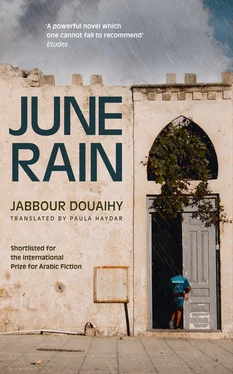He passed his time lounging on the balcony, content to sit in that cramped square surrounded by all those plants with their colourful early spring blooms. It was as though being there in his own house in the Gang Quarter was tantamount to temporary exile from his real home; he counted the days until he was to go back. He kept his head buried in a thick book. Kamileh threw a wool blanket on him the moment she felt the slightest draft, not wanting him to catch a chill, something he certainly could do without. He didn’t respond when his old friends happened to pass by, whether intentionally or by accident, and called for him. When they were sure Kamileh was occupied in the kitchen washing the dishes, cooking or fuming about something, they threw pebbles at him to attract his attention, or they whistled through their fingers to disturb him. But he paid no attention. It was as if he didn’t hear them, as if he was adrift in the world of his books. The boys exchanged looks of surprise, shrugged their shoulders and decided to leave him alone, because they had reached an age when they no longer begged for friendship.
On the following New Year’s Day, on one of his visits, he arrived with an accordion. The taxi dropped him off some distance away that day. Eliyya strapped the shiny wine-coloured instrument on his back and walked through the drizzling rain towards his house like a disciplined soldier carrying his gear, attracting a following of inquisitive young stragglers. In the afternoon, the rain stopped. The neighbourhood kids congregated near Kamileh’s porch as soon as Eliyya’s accordion belted out the first tune. They stared at him in silence as he stretched the bellows as far as they would open, the full length of his arms. He pulled them open only to push them back together again, at times bending over the accordion with his eyes closed as if feeling the pain of the sad tune or stamping his feet with joy when the rhythm picked up. He swayed along with the accordion, his fingers flying over the numerous black and white keys, drawing out a dazzling new sound never before experienced in those damp winding alleys of the neighbourhood. More and more people stopped to listen to him. At first he played a popular tune for the small baffled gathering, one they had all heard on the radio, Fayrouz’s ‘ Zurooni Kulli Sana Marra ’ (‘Visit Me Once a Year’) but soon they realised, as they listened along in astonishment, that he was now passionately playing Western tunes they didn’t recognise. They realised they were trying in vain to recognise the tunes, for Eliyya had abandoned their world. He had abandoned the riverbanks and the pilfering of plums and loquats in season, the games of daring and endurance. He had abandoned all of that for good. He had left for another realm they knew nothing about. Some of them felt he had even forgotten their names. It wasn’t that Eliyya had changed out of concern for his future as his mother wished, and it was not, as one might suppose, a matter of haughtiness on his part. Rather, it was as if he had suddenly become preoccupied with more important matters. They were unable, for example, to understand the talent that had enabled him to win first place in the school-wide French poetry competition. They saw his picture in the Telegraph , a shot of him as the competition organisers handed him the shiny metal trophy of a bird with outspread wings standing on one leg. They, on the other hand, persisted in the boorish ways of their ancestors, cursing the souls of the dead if they stumbled over a stone in the road, or aggressively asking bystanders who looked at them inquisitively what they wanted. They stopped inviting Eliyya to participate in their games. In fact, they stopped paying him any attention at all.
War broke out and Eliyya’s school was close to the green line. ‘We got clobbered once,’ Kamileh said. ‘We’ve had more than our share of it. No more!’
She tried to get her son out of Beirut temporarily by sending him to the mountains, to one of the summer resort towns in which her cousin resided, in a convent, and on their way up there they ran into an armed checkpoint. Amidst the commotion and because they weren’t familiar with the area they were passing through, they didn’t know if the armed men were stopping Christians or Muslims. It was enough of a scare for Kamileh to hand him over to the nun, but he didn’t last there more than two nights because the war was spreading up into the mountains and the bombs were falling close to the convent. The nuns prepared a bed for him down in the cellar, but soon Kamileh came scrambling back to retrieve him and take him all the way home to the Gang Quarter; to get there from Beirut they had to traverse tortuous mountain roads.
Back in our village, Eliyya was sentenced to house arrest. But again his imprisonment didn’t last, because it wasn’t long before the dangers caught up with us. Like water, the war seeped into all the regions it could possibly reach. It reached us at first in the form of incessant rumours about an impending attack for which the other side had amassed fighters from different nationalities and even different colours. When they started putting up barricades and young men started wearing battle fatigues and driving around in quasi-military style Jeeps on which slogans of old wars that had taken place a thousand years before were painted, Kamileh made a most difficult decision.
‘Out of the country with you, into God’s wide world. One has already died. We’re not losing another.’
She took advantage of a lull in the fighting to plan Eliyya’s trip. She packed his bags, stuffing them to the brim with wool sweaters, shirts and underclothes until they weighed twice the allowed weight. She had to seek the aid of the travel agent who in turn contacted the officials he knew at the airport to make sure she didn’t get charged for excess baggage. No one knew how Kamileh managed to accompany Eliyya into the passenger waiting area and from there through security where she quarrelled with the customs agents to make sure they didn’t throw away any of his things. Kamileh was accompanied by Muntaha, who told everyone in the quarter how Kamileh had been so preoccupied with Eliyya’s suitcases and provisions that she never had the chance to shed a tear over his departure.
Eliyya didn’t come back. His mother would receive a letter or two a year from him from New York City. A single page and a few lines, just enough to assure her that he was still alive. She also heard about him from returning students who had finished their studies in neighbouring US states. They had heard more about Eliyya than they had actually seen of him. In fact it was almost certain that all the young men of the village — there were approximately ten of them at the height of the war who formed a tight-knit community there — did not see him once at their regular meetings — not at Sunday mass at Saint Maroun Church, which no one could get out of, and not at the luncheons that followed during which they drank arak and made tabbouleh and became teary-eyed listening to Fayrouz. Some of them even flew in from other states in order not to miss these gatherings. They never saw Eliyya in person, but they did hear a lot about him. His name cropped up in the litany of people from the village who’d become prominent in some area, though the exact nature of his work remained obscure. Those who had seen him once or twice described him as if he were some other person — someone full of himself, preoccupied with his own intelligence, who spoke with a Midwestern accent and who scrutinised everything with his alert eyes. It was as if he were one of those Americans interested in the Middle East who pontificated in stiff language about structural reform in the Arab world on CNN in the late hours of the night or the small hours of the morning. He truly resembled them — tall, thin, a garish tie in colours made for television, eloquent, able to find just the right words with astonishing speed, as if reading his answers from a book.
Читать дальше












